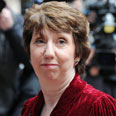
Ashton urges Iran cooperation
EU foreign affairs commissioner urges Islamic Republic to resume negotiation, says oil embargo 'designed to make sure Iran takes seriously our request to come to the table'
EU Foreign Affairs Commissioner Catherine Ashton held a press conference in Brussels Monday, in which she detailed the European Union's plan for an oil embargo on Iran.
Earlier Monday – and in what has been described as an unprecedented move – the EU's 27 foreign ministers adopted a decision to impose an immediate embargo on new contracts for crude oil and petroleum products, while existing contracts will be allowed to run until July.
Related stories:
- EU formally adopts Iran oil embargo
- US: International pressure affecting Iran
- Obama: Iranian economy in 'shambles'
Ashton explained that the measure was "part of trying to get a twin track approach... The pressure of sanctions is designed to try and make sure that Iran takes seriously our request to come to the table and meet."
Ashton urged Iran to resume negotiations on "issues we left on the table in Istanbul a year ago, or indeed to put forward their own proposals."
"We have adopted tough new sanctions on Iran because of the concerns we have over their nuclear program… We've added a series of new restrictions on the energy sector, including an embargo on Iranian crude imports to the EU and the financial sector, including the Central Bank of Iran, while ensuring that legitimate trade can continue under strict conditions," Ashton told reporters.
"I want to stress, however, that sanctions are not an end in of themselves. We've often talked about this being part of a twin-part approach, that the purpose of sanctions is to put pressure on Iran to come back to the negotiation table.
"That is a message that I have sent consistently through as many channels as I possibly can," she continues, "including a letter to the chief negotiator, in my conversations with the foreign minister of Iran and with many other interlocutors who have dialogue with Iran.
"We want to see them come back and either pick up the proposals we put on the table and look at those as potential confidence building measures , or to come up with ideas of their own," she said.
'Door still open for talks'
Earlier, British Foreign Secretary William Hague called the embargo part of "an unprecedented set of sanctions."
The United States welcomed the move. A Joint US Treasury and State Department statement said that the US "welcomes today's decision by the European Union to ban imports of Iranian crude oil and petroleum products, freeze the assets of the Iranian central bank, and take additional action against Iran's energy, financial, and transport sectors.
"The measures agreed to today by the EU Foreign Affairs Council are another strong step in the international effort to dramatically increase the pressure on Iran," the statement said.
France, Britain and Germany said on Monday they were willing to negotiate with Iran if it was ready to talk seriously about its nuclear program.
"We call on Iran's leadership immediately to suspend its sensitive nuclear activities and abide fully by its international obligations," said a joint statement by the leaders of Paris, Berlin and London.
"The door is open to Iran to engage in serious and meaningful negotiations about its nuclear program."
Prime Minister Benjamin Netanyahu welcomed the decision: "It's a step in the right direction. The sanctions must be tested according to the results. As of yet Iran continues to manufacture nuclear weapons uninterrupted," he said.
Iran meanwhile has shrugged off the new sanctions, saying the EU was not its only client for crude.
A top Iranian MP reiterated Tehran's threat to close the Strait of Hormuz, which is the main entry point to the Persian Gulf, if new sanctions block its oil exports.
"If any disruption happens regarding the sale of Iranian oil, the Strait of Hormuz will definitely be closed," Mohammad Kossari, deputy head of parliament's foreign affairs and national security committee, told the semi-official Fars news agency.
Reuters and AP contributed to this report
- Receive Ynetnews updates directly to your desktop











